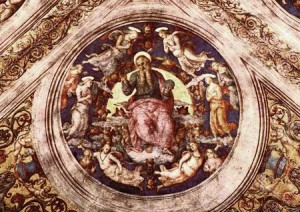Names of God
 Knowing God by name allows us to enter into a relationship with him in a very intimate, personal way. While many of us know Him as “God” or “Father,” there are a vast array of names to which he will answer—and each signifies yet another of his unique aspects.
Knowing God by name allows us to enter into a relationship with him in a very intimate, personal way. While many of us know Him as “God” or “Father,” there are a vast array of names to which he will answer—and each signifies yet another of his unique aspects.
The Eternal One
The name of God is often represented by the four Hebrew letters Yud-Hay-Vav-Hay and is never actually spoken. The High Priests in the Old Testament would have known the correct pronunciation but in their understanding of its sacredness, would have only uttered it in the silence of their hearts.
This four letter name is the name used when God identified Himself to Moses as “I AM WHO I AM;” thus identifying Himself as The Eternal One.
Adonai
To overcome the avoidance of uttering the too-sacred name—or of mispronouncing it, the title Adonai is the most often used substitution for Yud-Hay-Vav-Hay. In the Old Testament, the Tetragrammaton is found as the capitalized word “LORD.”
Hashem
Like Adonai, HaShem is a very popular name for God and means “The Name.”
In Leah’s life as Jacob’s wife, HaShem is the name of God who responds to Leah’s circumstances and blesses her with children. HaShem heard Leah’s prayers.
Leah talks of HaShem’s response to her prayers and so she names her children accordingly: Reuben, because HaShem had seen her affliction; Simeon, because HaShem had heard that she was unloved; Levi, because she hoped HaShem would join her husband to her; Judah, because she would praise HaShem.
El-Shaddai
El-Shaddai is the Almighty God who invited Abram, “Walk in my presence and be blameless. Between you and me I will establish my covenant, and I will multiply you exceedingly.”
El-Shaddai means “All Sufficient.”
God makes it clear to Abram that whatever he is being asked to do, he will do it with the might of the one who is “all sufficient” behind him. Even in the midst of circumstances that may seem foreboding, El-Shaddai promised to be at Abram’s side.
Jehovah-Elyon
It is the priest Melchizedek who proclaims that Almighty God is, in fact, Jehovah-Elyon: “Lord Most High.” The emphasis is on most high as it was often the case that pagan nations pitted their god against an enemy god and whoever had the most powerful, or most high, god was the “winner.” In using the name Jehovah-Elyon, there is no mistake that in these daily battles of “whose god is better,” the God that Abram serves is the Lord Most High, sovereign Creator and Ruler of the universe, bar none.
Jehovah-Repheka
The Gospels are filled with accounts of Jesus’ ministry of healing.
This name of God—Jehovah-Repheka—reveals that very nature of God as healer. He reveals his interest and willingness to heal us through this powerful name.
Although we will never fully understand the nature of God, he has used a number of names to help us along the way. He is the Lord of Hosts (Jehovah-Tsebaoth) who is always there (Jehovah-Shamah) and is righteous (El-Tsaddik).
He is El-De’ot—the God of knowledge who is compassionate (El-Rachum), gracious (El-Channun), and strong (El-Sali).

